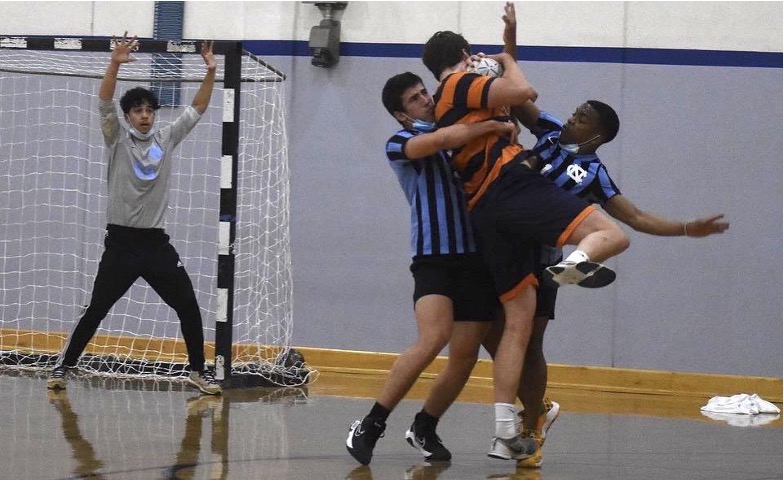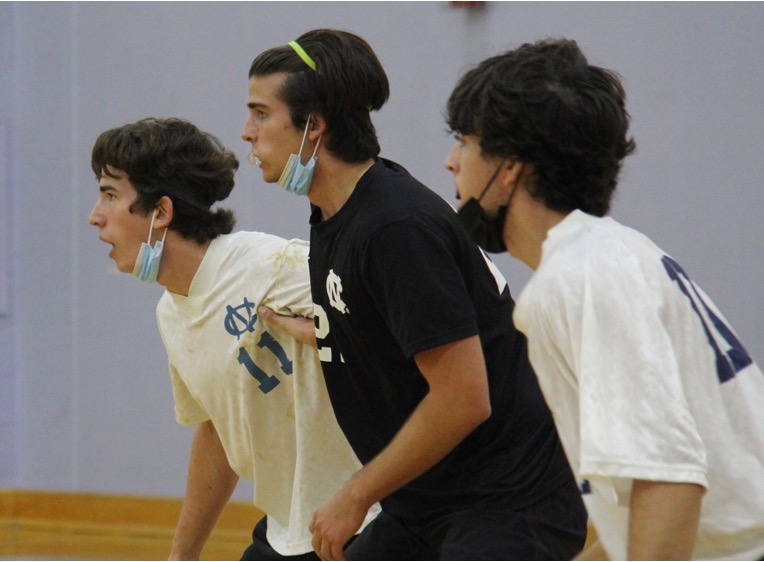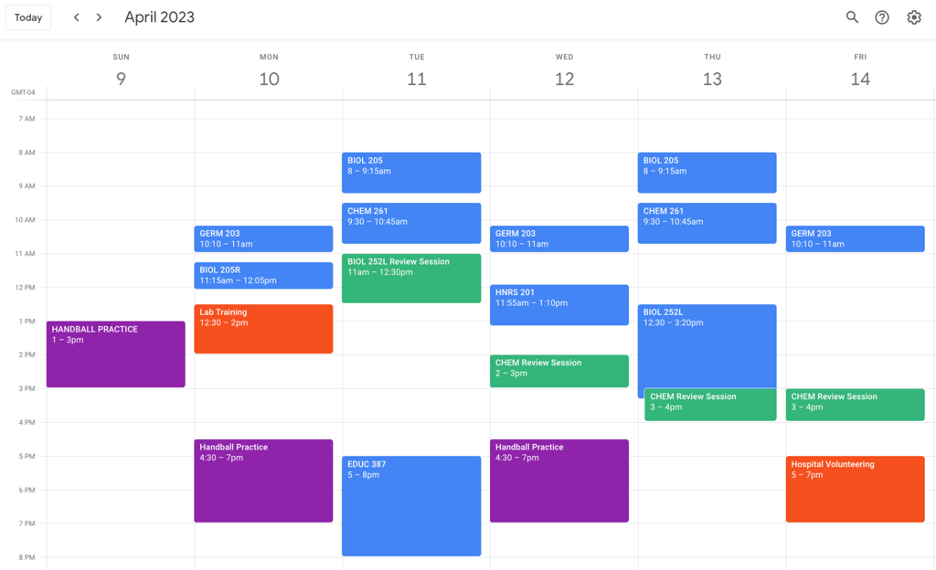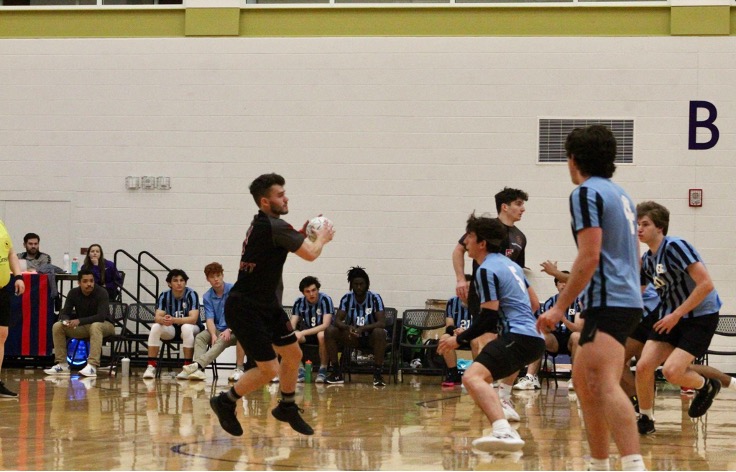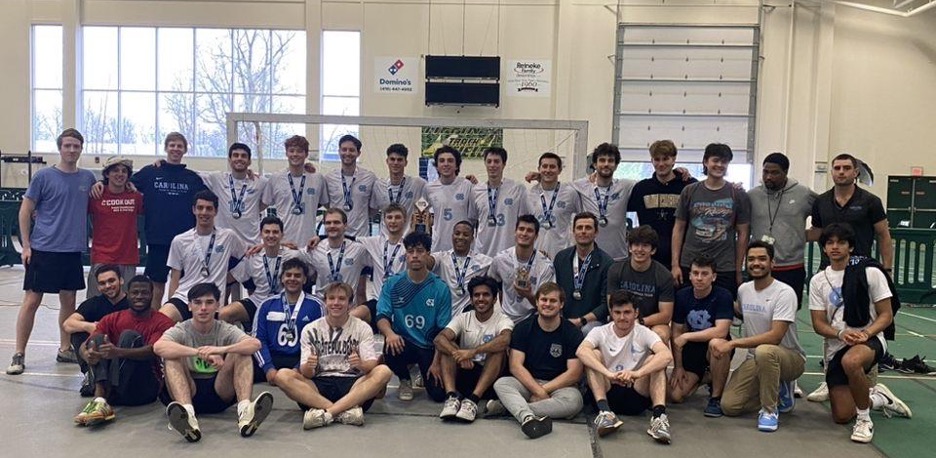Finding the “I” in Team Handball
By Tommy, a Peer Tutor
For over a thousand students at UNC, club sports are an integral part of collegiate life. If you aren’t aware, club sports are on-campus, student-led organizations that focus on a sporting interest. There are a lot of differences between the various club sports offered at UNC, but all typically have at least a few competitions a year and regular practices. I am a member of UNC Club Team Handball.
The sport, “team handball” (often called just “handball”), is pretty unfamiliar to most Americans. It’s understandable if your exposure to the sport has been limited to a brief snippet of Olympic highlights or an Instagram reel that you quickly scrolled past. If you ask any of my teammates to explain team handball, they will all give you a different answer. My personal favorite is “water polo, without the water,” but many will say “lacrosse without the sticks” or “football, hockey, and soccer, combined in a European blender.”
Current club president Malachi Jowers and I giving a UVA player a very emphatic hug–hugging is a crucial skill that truly separates a good handballer from an okay handballer.
I first picked up the sport when my brother, who was a senior at the time and on the handball team, encouraged me to go to a few practices. I wasn’t immediately hooked, and I thought a lot of the rules were pretty dumb. However, I stuck with it, and I am glad I did; the people I have met in this sport have been truly incredible, and I wouldn’t trade anything for all of the fond memories I have made in this sport. That being said, my experience in this sport has definitely been accompanied by its fair share of challenges.
My first two semesters went very well. I was pretty terrible at the start, but I was steadily improving and very optimistic. I made most of my friends through the handball team, and I loved hanging out with them. I was also doing well enough academically, so I wasn’t too stressed. Freshman year (especially handball) was a grand ol’ time.
My brother and me playing handball against each other (he is in the black shirt and I am number 11).
I went into my sophomore year with a great attitude. My academics were in good shape, I had been selected as an officer for handball, and I was confident that I would finally get to play on the Carolina team (our “varsity” team is called Carolina–I spent my first year on the Tarheels, the equivalent of the “junior varsity” team). Both handball and school were shaping up perfectly, and I was ready to hit the ground running.
However, things started off very differently compared to freshman year. For all my classes, it seemed like I either didn’t like my professor or realized I could have added a better class. I switched out of almost all of them and emailed a bunch of professors, desperately pleading for a spot in their class. I had to take what I could get, and I ended up with a rather disorganized and awkward schedule.
I was also having difficulties with handball. My brother had graduated and headed off to law school, and most of the other seniors were gone as well. As an officer, I was expected to fill their shoes and help lead the club, but Sunday and Monday practices seemed impossible to attend when I had hours of lab work to do and regular tests on Tuesdays. Trying to fill my role as an officer, balance coursework, and attend practices was starting to become overwhelming. My hopes of making an impact on the Carolina team began to feel far-fetched, and I wasn’t improving athletically at nearly the rate that I had wanted or expected.
I realized things had truly gone south before our first home tournament, the Tar Heel Invitational. Our president asked to speak with me, privately, during practice. I assumed he wanted to tell me that I was to be on the Tarheel team–and not the “varsity” Carolina team–for the tournament, which I would have understood. I had been skipping practices somewhat frequently, and although I thought I may have had the skill to be on Carolina, I didn’t have the dedication.
However, he didn’t tell me that I would be on the Tarheel team for the tournament. Instead, he told me that I wasn’t on any team for the upcoming tournament. This was hard to hear. Although I often refer to handball as my “silly little sport I play for fun,” it is, undoubtedly, a significant part of my life. The friends I have made playing handball are some of my best friends ever, and by this time I had truly grown to appreciate the weird aspects of this European sport.
By the time the THI had come around, I had gotten my act together enough to make the Tarheel roster, but I was certainly dejected. I was upset that I had been threatened with removal from the organization as a whole, and I was not optimistic about my future on the team.
At this point in the blog post, you are probably wondering what this post has to do with the Learning Center or the learning process at all.
I wanted to reflect on my personal learning process in my undergraduate studies, and there have certainly been times when it has looked grim. I was doing poorly in my academics at this point, and I was stressed–all the time. Balancing handball and school was proving to be extremely difficult. I felt like if I skipped practice to do work, I’d be letting my teammates down, and if I went to practice, I couldn’t get my work done, and I’d be letting myself down. It was unsustainable, and I was determined to change things going into my fourth semester. I wanted to find a way to have fun in handball again, and knew I could do well academically at the same time.
My class schedule was going to be no easier than my third semester. I was taking Anatomy lab, Orgo 1, German, and Dev Bio. My workload was no less intense, but I was determined to change my approach.
The first thing that I did was get a lab later in the week. My biggest recommendation for any STEM major is to find what times you want your labs/studios and then schedule them with the highest priority. They are typically huge time commitments and can have significant effects on your performance. Personally, I prefer my labs to be later in the week so that I can use my weekends for review, and not pre/post lab assignments. Luckily, I got into a Thursday lab for Anatomy, which is exactly what I needed.
Next, I got organized. If you don’t have a Google calendar, get one. When this semester started I decided to really lean into the cult of the “study cycle.” I was strict about implementing spaced repetition, and I made my calendar reflect this.
I started by laying out all my classes and immovable obligations. I looked at my different class websites to determine which review sessions I could attend for my classes. A main component of the study cycle is reviewing material after class, and I think this is one of the best ways to accomplish that. I also made sure I would have time to do my Anki flashcards for my anatomy class every day.
This was my Google Calendar during a fairly typical week in my fourth semester. My biggest change this semester was attending review sessions and independently studying in the awkward gaps between my obligations that ended in the early afternoon and those that began in the early evening.
I found myself doing much less cramming and I seemed to be utilizing much more of the time that I would have spent just sitting on my phone between classes. Although I did well for the first part of the semester with these new strategies, I had a true test of this new strategy coming up soon. During one of the final weeks of the semester, I noticed I had my third Orgo midterm, a German midterm, and my final exam for Anatomy all in the week directly after college nationals, our most important tournament of the year.
I was on the fence about whether or not I should opt out of the tournament. It was being held in the beautiful state of Ohio, nine hours away by van. I knew I wouldn’t be able to study on the drive, but I was also confident that I had worked hard and could take it on.
I prepared by making a study plan for the week and a half prior. I knew that it would be extremely difficult to study while on the road during an away tournament, so I made sure I would be able to make up for that lost time.
I then set aside time for all of the review sessions I could possibly attend the week prior. I recognized that they worked as effective strategies for me, and I wanted to take full advantage.
I planned to complete my most challenging assignments at the beginning of the week, and my easier assignments at the end of the week. Although I couldn’t necessarily study well in a moving van, I would be able to complete most of my “busy work” assignments. Additionally, getting the hard assignments out of the way early made me feel free to put all of my mental energy toward studying.
I found occasional opportunities to study during the trip, but for the most part, I truly couldn’t rely on cramming, and I had to trust that my new evidence-based study strategies from earlier in the semester would pay off. Fortunately, they did. I performed even better than I had hoped and was happy to have proof that my new habits were finally working. My fourth semester was a success.
I was able to reassess my academic goals and change some important aspects, but I don’t want that to be the sole takeaway of this blog post. I think it is important to note how I changed my perspective in terms of handball as well.
Most notably, I ended up staying on the Tarheel team, and I had an amazing time. I think I really benefited from getting to know all of the new members of the club, and I wasn’t stressed that I didn’t live up to the “goals” I had put so much pressure on myself to accomplish. I had so much fun, and I firmly believe that is what club sports are all about. I was staying healthy and hanging out with all the amazing people that initially drew me to this organization.
Teammates Sam Hetherington, Holden Wright, and me about to play defense against Ohio State.
Here at the Learning Center, we like to mention the term “metacognition,” which is the practice of “thinking about your own thinking.” During this part of my academic journey, I realized that I had a distinct conflict between sports and academics, and what I was doing simply wasn’t working. As a result, I reevaluated my studying habits and decided to switch things up. I found solid, evidence-based strategies that worked for me and I had a much better and more fun semester. That being said, I definitely haven’t “cracked the code,” but I am making progress. I am always trying my best to ask myself what is and isn’t working and then adjust accordingly. It helps me, and I encourage all to do the same.
I am super grateful for all my club mates, especially those on the Tarheel team who accepted me onto their squad and played alongside me. I am so happy to be a part of such a great organization, and if you want something fun to do, I cannot recommend joining a club sport enough (specifically handball).


